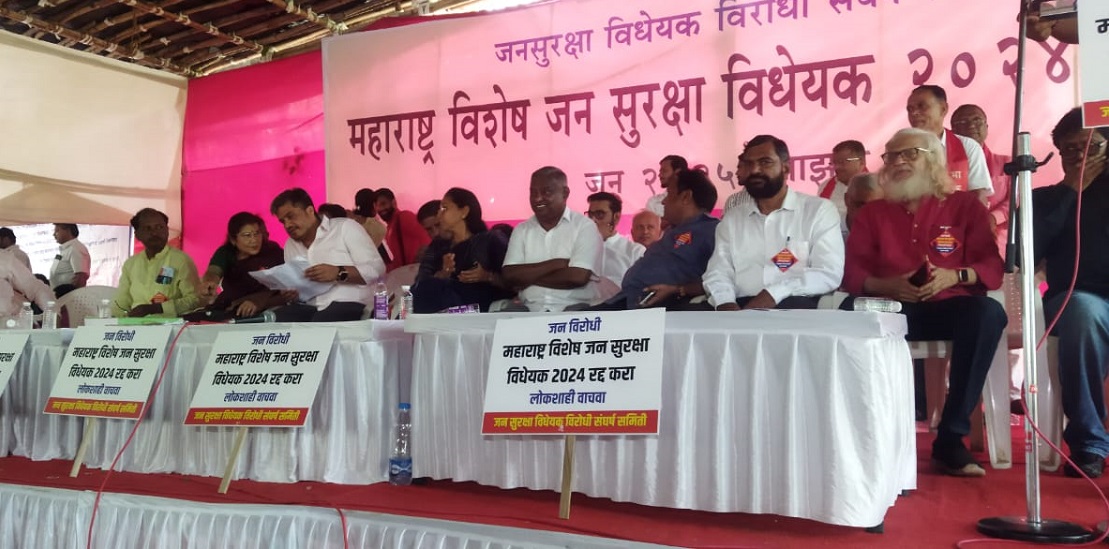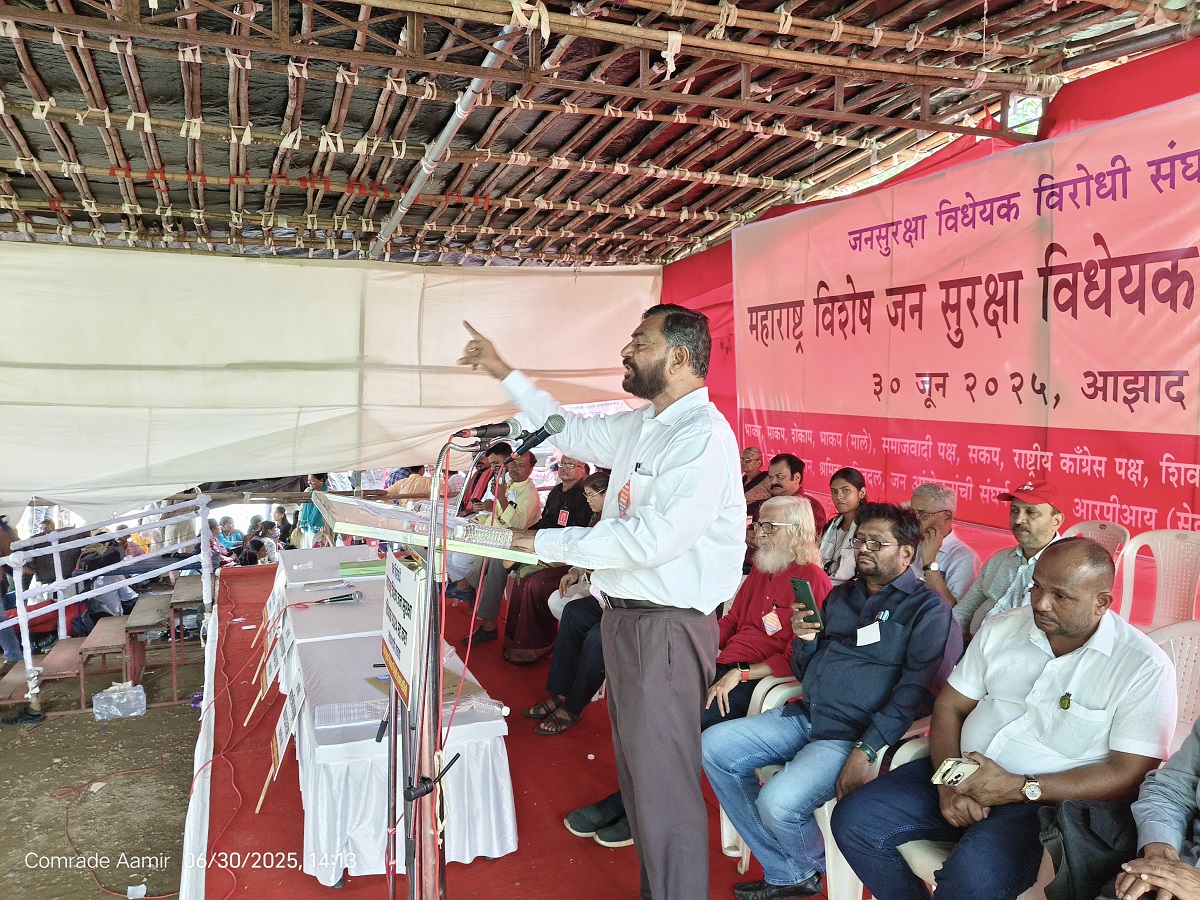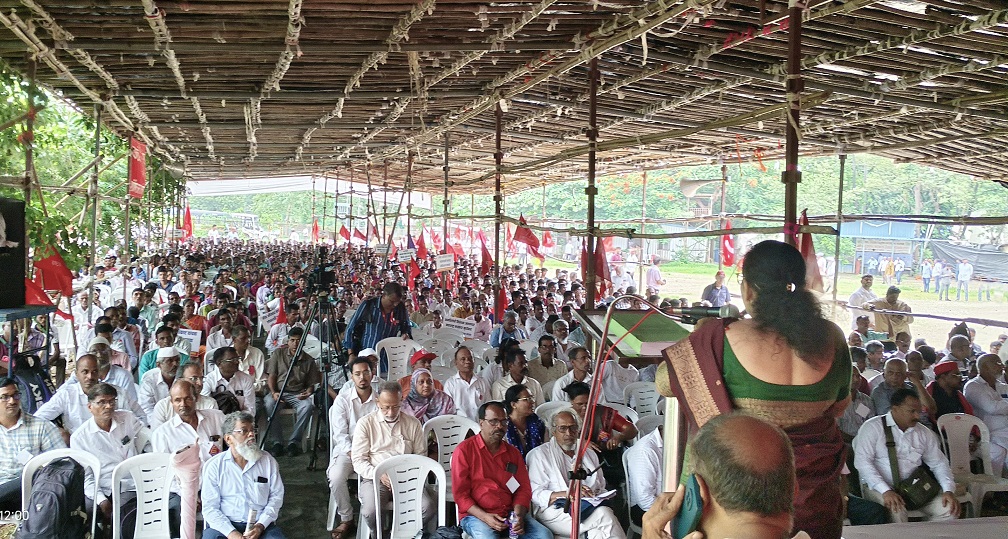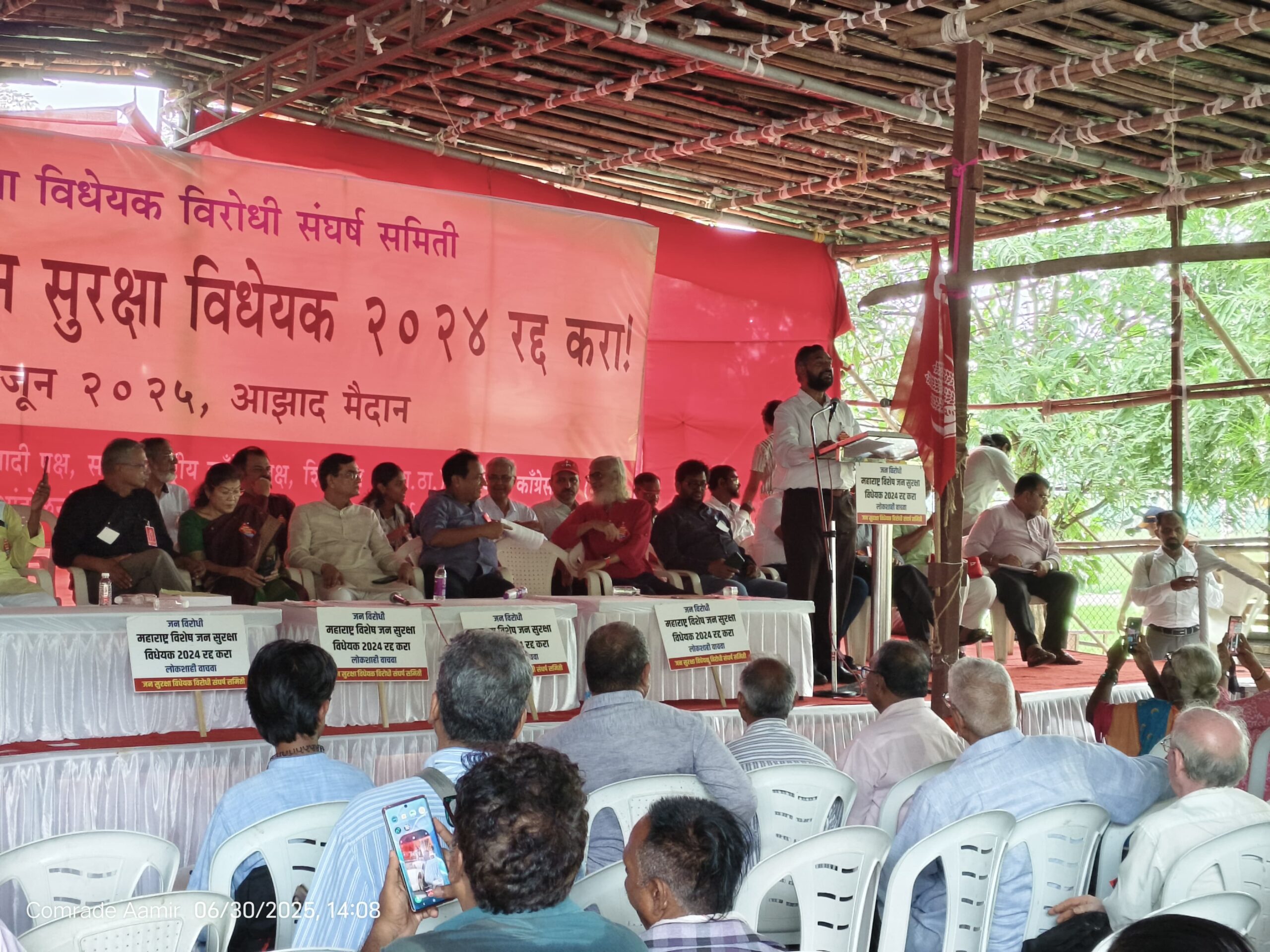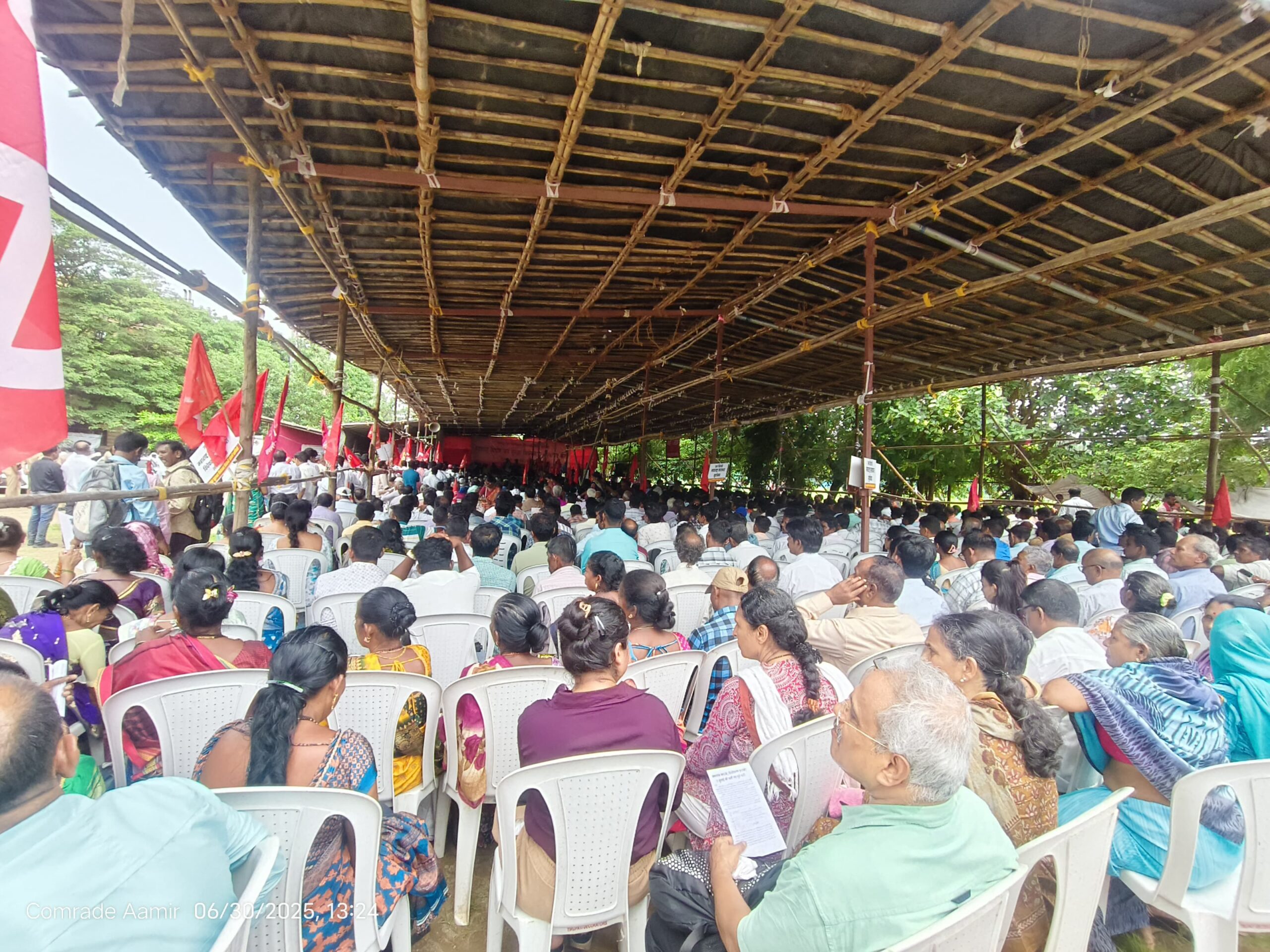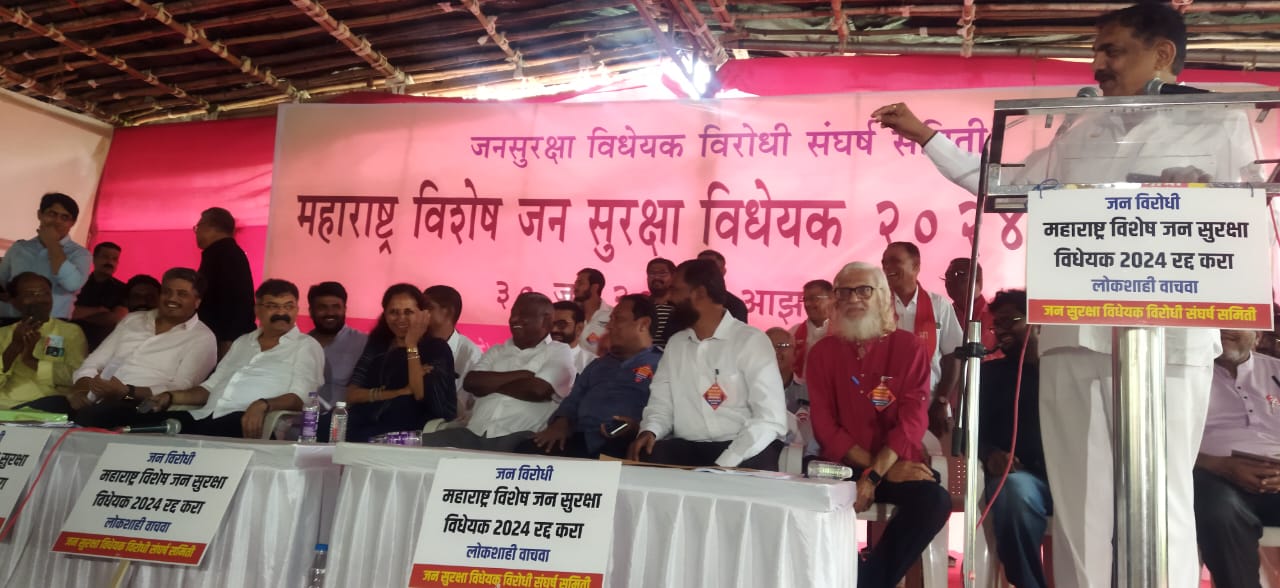Azad Maidan turned into a powerful site of resistance today, June 30, as thousands gathered under the banner of people’s movements, left parties, to oppose the Maharashtra Special Public Safety Bill, 2024. The protest was also supported by the opposition parties, that is the Maha Vikas Aghadi (MVA). With the bill expected to be tabled in the monsoon session of the Assembly, the protest marked one of the most unified public mobilisations in recent years against what is widely perceived as a legal weapon against dissent.
The mobilisation was, in large part, organised by the Communist Party of India (Marxist) and the Communist Party of India, with support from people’s organisations. Key MVA constituents—the Shiv Sena (Uddhav Balasaheb Thackeray), Indian National Congress, and the Nationalist Congress Party (Sharad Pawar faction) turned out in support. The turnout reflected a broad political front, including working-class organisations, students, farmers’ unions, and civil liberties groups.
State Secretary of the CPI (M), Dr. Ajit Nawale, had issued an open call for participation across Maharashtra, urging district units to treat this as a “decisive stand against authoritarianism.” Protesters arrived from across the state—by bus, train, and private vehicles—responding to the call to defend democratic rights.
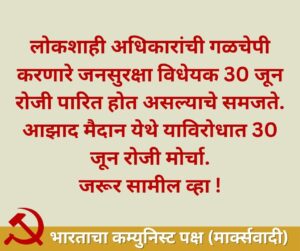
Opposition and civil society leaders stand together
Several prominent leaders stood in solidarity at the protest. Shiv Sena (UBT) leader Uddhav Thackeray, Supriya Sule of the NCP (SP), CPI state secretary and labour organiser Subhash Lande and senior social activist Ulka Mahajan joined demonstrators at Azad Maidan, expressing serious concern about the implications of the bill.
These leaders and activists highlighted how the Bill, under the pretext of “public safety,” could be used to suppress dissent, criminalise activism, and target opposition voices. They noted that terms such as “radical Left-wing organisations” and “urban Naxal” remain undefined and dangerously broad in the amended draft, leaving space for arbitrary interpretation.
Other speakers also pointed out that the bill’s provisions—such as unchecked powers to evict communities (Section 9), seize properties (Section 10), and deny lower court remedies (Section 12)—mirror the most draconian aspects of laws like the UAPA and NSA.
From every corner of Maharashtra, a message of resistance
The crowd was a mix of students, youth, farmers, trade unionists, and senior citizens. Red flags and protest banners filled the grounds of Azad Maidan. Many held up pamphlets circulated by the organising groups, breaking down the bill’s most dangerous provisions and urging complete withdrawal—not mere amendments. Visuals from the ground show the scale and intensity of the crowd gathered at the ground. Protesters emphasised that the Joint Committee’s amendments are superficial and leave intact the state’s power of surveillance, to prosecute, and punish under vaguely defined offences (Detailed report on earlier protests may be viewed here)
Backdrop: The Bill’s imminent passage in the Monsoon Session
The Maharashtra government had invited public comments and criticisms on the Bill, to be submitted by April 1. Among thousands of others, Citizens for Justice and Peace had also submitted an elaborate critique. This may be read here. The protest coincides with the start of the Maharashtra Assembly’s monsoon session, where the revised Maharashtra Special Public Safety Bill is likely to be introduced. Although the Joint Committee proposed some changes—such as limiting the bill’s applicability to organisations and raising the investigation officer’s rank—rights groups and opposition parties have argued that these are cosmetic changes that do not alter the repressive core of the legislation.
The continued use of ideological terms, the lack of statutory definitions, and the shielding of officials from prosecution (Sections 14 and 15) have all been flagged as severe threats to constitutional safeguards. The committee’s refusal to hold public hearings with those who submitted objections has also drawn sharp criticism.
The joint coalition of activists, people’s organisations and the left front have strongly critiqued the published ‘report of the Joint Committee.’ Citizens for Justice and Peace presents its critique here:
Note on Joint Committee Report on the Maharashtra Special Public Safety Bill, 2024: Superficial amendments, structural repression intact
June 30, 2025
What has been termed as the Joint Committee’s report on the Maharashtra Special Public Safety Bill, 2024 (Assembly Bill No. 33), appears to be a clear whitewash of the actual discussions that took place with members of the Opposition over five sittings since the Committee was formed. The obvious motive of this government is not even to record or allow the dissent and voices that were raised by members of the Opposition (Maha Vikas Aghadi) on key aspects of the Bill which includes definitions, seizure and arrest powers, superintendence of investigations, constitution of the Advisory Board and also the denial of one tier of justice, the district courts for first appeals.
Fundamentally, the very insistence of this regime and administration for the passage of a fourth law to ostensibly counter terrorism (or Naxal-caused terror) when Maharashtra already has the Maharashtra Control of Organised Crimes Act (MCOCA) since 1999, the Unlawful Practices (Prevention) Act since its inception –first 1967 and post 2004 with multiple amendments since it’s a central law—and finally the 2023 Bharatiya Nyaya Samhita (BNS) Sections 113-119 that have incorporated all draconian sections of the UAPA in everyday criminal law. [The justification, therefore that ‘other states have such a law’ is nullified by the facts: these states had enacted these legislations before the UAPA in amended form applied to the entire country and also the BNS, 2023.]
What can be the reasons (or the motive) to bring in a fourth such legislation when the above stringent provisions are already in force? Except to use it as a sword over the heads of activists (political and social), writers, dissenters, political opponents—in fact any person/s who are “inconvenient” to the regime or administration? A fourth law with draconian provisions will make bail impossible!
The press note by the government on behalf of the Committee clearly reveal that the discussions and deliberations notwithstanding, the attitude of the state government has not changed and the final Bill (in few form) when it will be tabled, will continue to be riddled with core constitutional defects.
Changes outlined in the Press Note June 26, 2025 on “Committee’s Findings:
The changes made are cosmetic, rhetorical, and deliberately evasive. The bill retains its unconstitutional structure, vague terminology, and legal architecture that allows for the criminalisation of dissent, targeting of political opponents, and violation of fundamental rights.
Despite widespread opposition, extensive written objections, and participation from multiple political formations and civil society organisations, the Committee has made only three formal amendments:
- Rewording the objective clause to target “radical Left-wing organisations or similar organisations”;
- Recasting the composition of the Advisory Board;
- Raising the investigating officer’s rank from Sub-Inspector to Deputy Superintendent of Police.
None of these changes address the key concerns raised regarding the need for multiplicity of counter terror laws, wide definitions, unchecked executive power, procedural violations, denial of legal remedy, and institutional impunity. This report, therefore, must be categorically rejected. The bill remains a direct attack on India’s constitutional order.
I. Title and Objective: Politically weaponised language, vague in law
Original title:
“A Bill to provide for the more effective prevention of certain unlawful acts of persons and organizations…”
Amended title:
“A Bill to effectively prevent certain illegal activities of radical Left-wing organisations or similar organisations…”
Analysis:
- The rewording does not narrow the scope. It simply replaces generic terms with ideologically charged and undefined phrases.
- The inclusion of “radical Left-wing organisations or similar organisations” is deliberately vague. No legal definition of “radical” is provided. The phrase “similar organisations” creates infinite elasticity, allowing any ideological formation—even peaceful or democratic—to be labelled a threat. [Note: Radical Right-Wing Organisations have escaped all consideration or mention!]
- The justification for this framing lies in the invocation of “urban Naxalism”—a politically loaded term with no statutory definition. Its continued use codifies the state’s ideological hostility to dissent.
Conclusion: This amendment intensifies the bill’s politically motivated purpose. Here is not a law to main peace or law and order, but a tool to terrorise and silent dissent. It reinforces a narrative in which civil society actors, trade unions, student groups, and political opponents can be branded as subversive. The bill’s objective remains a tool of ideological surveillance, not a legitimate legal safeguard.
II. Advisory Board: Erosion of judicial independence
Original Clause 5(2):
The Advisory Board was to comprise individuals who “are or have been judges of a High Court or are eligible for appointment.”
Amended Clause:
Now allows appointment of:
- Retired High Court Judges
- Retired District Judges
- Government Advocates of the High Court
Analysis:
- This amendment is a deliberate dilution of judicial independence.
- Government advocates are functionaries of the executive. Their inclusion on a body meant to evaluate the legality of state actions obliterates the principle of neutral oversight.
- Retired district judges do not carry the constitutional status or independence of High Court judges.
- The executive retains unchecked power to choose pliant members, turning the Advisory Board into a formal rubber stamp.
Conclusion: The Advisory Board, which was supposed to serve as a procedural check, has now been structurally compromised. The amendment institutionalises executive capture of oversight mechanisms.
III. Investigating Officer Rank: Cosmetic bureaucratic adjustment
Original Clause 15(1):
Police officers not below the rank of Sub-Inspector to investigate offences under the Act.
Amended Clause:
Investigation restricted to officers of the rank of Deputy Superintendent of Police or above.
Analysis:
- Raising the rank of the investigating officer is an administrative change. It does not alter the grounds, process, or criteria of investigation.
- The real issue is not who conducts the investigation, but what can be investigated.
- The law allows vague, subjective interpretation of terms like “association,” “support,” or “membership” of radical groups.
- The UAPA and NSA demonstrate that higher rank officers have been equally complicit in abuse and arbitrary arrests.
Conclusion: This amendment is a public relations manoeuvre, not a safeguard. It creates the illusion of due process while leaving arbitrary detention and criminalisation of dissent fully operational.
IV. Structural defects the Committee has deliberately ignored
The most dangerous provisions of the original bill, identified in detailed submissions by multiple groups including CJP, remain untouched. The committee has not even acknowledged, let alone amended, the following especially:
Section 2(f): Overbroad definition of “Unlawful Activity”
- No revision made.
- The section allows any form of protest, critique, or public mobilisation to be interpreted as a threat to public order.
Section 9: Arbitrary eviction and property seizure
- District Magistrates and Police Commissioners retain absolute powers to seize properties and evict residents from notified areas.
- Only a vague promise of “reasonable time” to vacate is offered to women and children.
Section 10(1): Confiscation of moveable property
- No legal safeguards introduced.
- Entire homes, records, belongings, and finances can be seized on executive suspicion.
Section 12: Bar on district-level legal remedy
- Individuals can only approach the High Court or Supreme Court to challenge state action.
- This provision deliberately denies access to justice for economically weaker citizens and violates the principle of accessible legal redress.
Sections 14 & 15: Blanket immunity to officials
- Officers and magistrates acting under the law are granted total immunity, even when they violate constitutional rights.
- No mechanisms for accountability or independent review have been introduced.
Conclusion: The bill continues to function as an extra-constitutional regime. It merges preventive detention, ideological policing, and property seizure into a legal framework shielded from public accountability and judicial review.
V. Committee’s Ideological Closing Statement: Criminalising youth and dissent
The report ends with a “recommendation” urging the state to act against the “growing attraction” of youth to Naxalism and to implement policies to “discourage” them and “bring them into the mainstream.”
Analysis:
- This ideological framing reinforces that the law is designed to monitor, control, and neutralise student movements, political education, and grassroots activism.
- The state’s role is redefined not as a guarantor of rights, but as a censor of ideas.
Conclusion: The bill is not preventive security legislation. It is a state doctrine against dissent, designed to criminalise political education, intellectual opposition, and mobilisation.
This report must be rejected in its entirety!
The Joint Committee has failed in its legislative duty to protect constitutional values. It has whitewashed a draconian bill under the guise of minor technical amendments. What remains is a legal instrument of political repression.
The bill:
- Treats opposition as extremism
- Treats mobilisation as subversion
- Treats dissent as treason
This is a dangerous precedent. Not just that the Maharashtra government has reduced the functioning of a democratically set up Committee with Members of the Opposition in the State Assembly to tokenism but is proceeding –riding roughshod over critiques of such a law—with a statute that will have dangerous consequences. If enacted, it will be used to target civil society, demolish protest movements, paralyse unions, and intimidate the political opposition across Maharashtra.
Note prepared by Team Citizens for Justice and Peace
Related:
Maharashtra Unites: State-wide protests to take place against controversial MSPS Bill on April 22
Understanding the Maharashtra Special Public Security (MSPS) Bill, 2024 | Threat to Civil Liberties?
Press Release: Experts warn, Maharashtra Special Public Security Bill a threat to civil liberties

